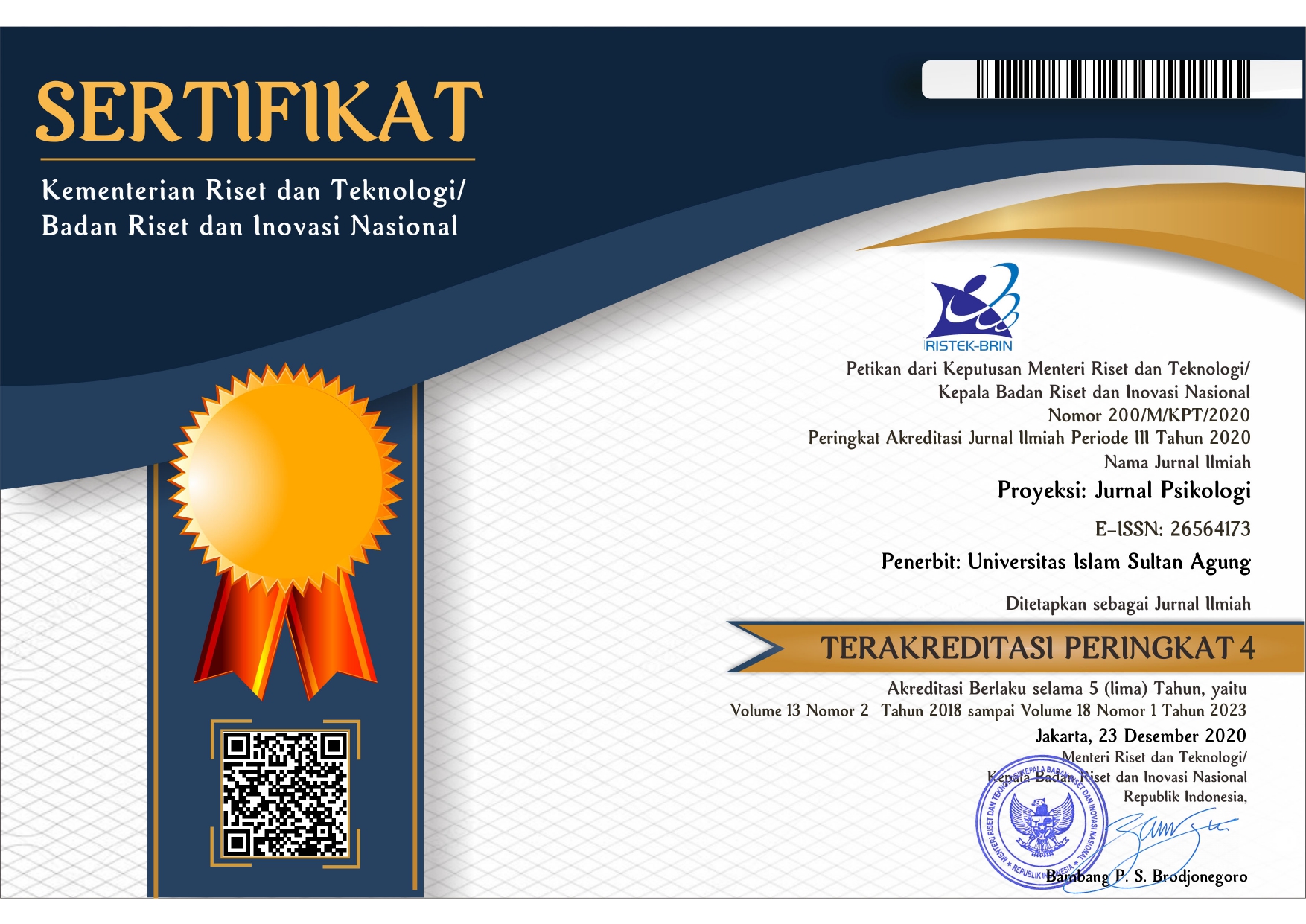HUBUNGAN ANTARA INTIMATE FRIENDSHIP DENGAN SELF DISCLOSURE PADA MAHASISWA PENGGUNA WHATSAPP
Abstract
Penelitian ini bertujuan untuk mendeskripsikan self disclosure dan intimate friendship serta untuk mengetahui hubungan antara intimate friendship dengan self disclosure pada mahasiswa pengguna WhatsApp. Jenis penelitian yang digunakan adalah kuantitatif korelasional. Teknik sampling yang digunakan adalah teknik purposive sampling, dengan sampel 111 mahasiswa pengguna WhatsApp di Sumatera Barat. Analisis data menggunakan Analisis regresi linier berganda dan analisis tambahan menggunakan Independent sample T Test. Self disclosure pada mahasiswa pengguna WhatsApp cenderung rendah dan intimate friendship pada mahasiswa cenderung tinggi. Berdasarkan analisis data, diperoleh hubungan antara intimate friendship dengan self disclosure pada mahasiswa pengguna WhatsApp. Nilai R Square penelitian ini sebesar 0.505 yang berarti dimensi intimate friendship mempengaruhi self disclosure sebesar 50.5%. Analisis tambahan menunjukkan tidak terdapat perbedaan self disclosure dan intimate friendship ditinjau dari usia dan jenis kelamin.
Keywords
Full Text:
PDFReferences
Anwar, N., & Riadi, I. (2017). Analisis investigasi forensik WhatsApp Messenger smartphone terhadap WhatsApp berbasis Web. Jurnal Ilmu Teknik Elektro Komputer Dan Informatika, 3(1), 1–10. https://doi.org/10.26555/jiteki.v3i1.6643
Attrill, A. (2013). Sharing only parts of me : Selective categorical self-disclosure across internet arenas. International Journal of Internet Science, 7(1), 55–77.
Buntaran, F. A. A. & Helmi, A. F. (2015). Peran kepercayaan interpersonal remaja yang kesepian dalam memoderasi pengungkapkan diri pada media jejaring sosial online. Gadjah Mada Journal of Psychology, 1(2), 106–119.
Chen, X., Pan, Y., & Cai, S. (2013). User self disclosure on SNSs : A privacy risk and social capital perspective. The International Conference on Electronic Business, 1-9.
Christofides, E., Muise, A., & Desmarais, S. (2012). Hey mom, What’s on your Facebook? Comparing Facebook disclosure and privacy in adolescents and adults. Social Psychological and Personality Science, 1–7. https://doi.org/10.1177/1948550611408619
DeSousa, D. A., & Cerqueira-Santos, E. (2012). Intimate friendship relationships among young adults. Paidéia, 22 (53), 325–333.
DeVito, J. A. (2011). Komunikasi antarmanusia. Tangerang: Karisma Publishing Groups.
Fauzia, A. Z., Maslihah, S., & Ihsan, H. (2019). Pengaruh tipe kepribadian terhadap self disclosure pada dewasa awal pengguna media sosial Instagram di kota Bandung. Jurnal Psikologi Sains Dan Profesi, 3(3), 151–160.
Gainau, M. (2009). Keterbukaan diri (self disclosure) siswa dalam perspektif budaya dan implikasinya bagi konseling. Jurnal Ilmiah Widya Warta, 1-18.
Kartika, H. D. (2010). Hubungan antara sense of humor dan intimate friendship pada remaja. Psikologi Universitas Brawijaya, 1–11.
Knop, K., Oncü, J. S., Penzel, J., Abele, T. S., Brunner, T., Vorderer, P., & Wessler, H. (2016). Offline time is quality time. Comparing within-group self-disclosure in mobile messaging applications and face-to-face interactions. Computers in Human Behavior, 55(1), 1076–1084. https://doi.org/10.1016/j.chb.2015.11.004
Leung, L. (2002). Loneliness, self-disclosure, and ICQ (“i seek youâ€) use. Cyberpsychology & Behavior, 5(3), 241-251.
Livingstone, S. (2008). Taking risky opportunities in youthful content creation : Teenagers use of social networking sites for intimacy, privacy and self-expression. New Media & Society, 10(3), 393–411. https://doi.org/10.1177/1461444808089415
Paluckaitė, U., & Matulaitienė, K. Ž. (2012). Gender differences in self-disclosure for the unknown person on the internet communication. Advanced Research in Scientific Areas, 961–966. https://doi.org/10.13140/2.1.5036.0328
Pohan, F. A & Dalimunthe, H. A. (2017). Hubungan intimate friendship dengan self-disclosure pada mahasiswa Psikologi pengguna media sosial Facebook. Jurnal Diversita, 3(2), 15–24.
Putri, A. F. (2019). Pentingnya orang dewasa awal menyelesaikan tugas perkembangannya. SCHOULID: Indonesian Journal of School Counseling, 3(2), 35–40.
Rahmawati, U. M., & Soeharto. (2014). Kontribusi penerimaan teman sebaya terhadap pengungkapan diri siswa kelas VIII SMP Negeri 1 Masaran tahun pelajaran 2013/2014. Jurnal Bimbingan Dan Konseling, 1–14.
Riska, N., & Harmaini. (2019). Hubungan antara sense of humor dan intimate friendship. Psikoislamedia Jurnal Psikologi, 4(1), 36–47.
Robinson, S. C. (2017). Self-disclosure and managing privacy: implications for interpersonal and online communication for consumers and marketers. Journal of Internet Commers,.16 (4), 385-404.
Ruppel, E. K., Gross, C., Stoll, A., Peck, B. S., Allen, M., & Kim, S. Y. (2016). Reflecting on connecting: Meta-analysis of differences between computer mediated and face to face self disclosure. Journal of ComputerMediated Comunication. 1-17.
Setyaningsih, R. (2019). Memahami hubungan kebutuhan untuk populer dan keterbukaan diri (self-disclosure) pada pengguna Facebook: Sebuah tinjauan literatur. Proyeksi, 11(1), 93–104.
Shahid, S. (2018). Content analysis of Whatsapp conversations : an analytical study to evaluate the effectiveness of Whatsapp application in Karachi. International Journal of Media, Journalism and Mass Communications, 4(1), 14–26.
Sharabany, R. (1994). Intimate friendship scale: Conceptual underpinnings, psychometric properties and construct validity. Journal of Social and Personal Relationships, 11, 449–469.
Sharabany, R., Eshel, Y., & Hakim, C. (2008). Boyfriend , girlfriend in a traditional society : Parenting styles and development of intimate friendships among Arabs in school. International Journal of Behavioral Development, 32(1), 66–75. https://doi.org/10.1177/0165025407084053
Sugiyono. 2013. Metode Penelitian Kuantitatif, Kualitatif, dan R &D. Bandung: Alfabeta
Walrave, M., Vanwesenbeeck, I., & Heirman, W. (2012). Connecting and protecting ? Comparing predictors of self-disclosure and privacy settings use between adolescents and adults. CyberPsychology: Journal of Psychology Research on Cyberspace, 6(1). https://doi.org/10.5817/CP2012-1-3
We are Social. (2019). Digital in 2019. Diperoleh dari https://wearesocial.com/global-digital-report-2019.
Wheeless, L. R., & Grotz, J. (1976). Conceptualization and measurement of reported self-disclosure. Human Communication Research, 2(4), 338–346. doi:10.1111/j.1468-2958.1976.tb00494.x
Yu, T. (2014). Gender differences on self-disclosure in face-to-face versus E-mail communication. ICELAIC, 742–745.
DOI: http://dx.doi.org/10.30659/jp.15.2.192-201
Refbacks
- There are currently no refbacks.

Proyeksi by https://jurnal.unissula.ac.id/index.php/proyeksi/ is licensed under a Creative Commons Attribution-ShareAlike 4.0 International License.


